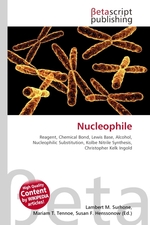Nucleophile
Lambert M. Surhone, Miriam T. Timpledon, Susan F. Marseken
бумажная книга
High Quality Content by WIKIPEDIA articles! In chemistry, a nucleophile (literally nucleus lover as in nucleus and -phile) is a reagent that forms a chemical bond to its reaction partner (the electrophile) by donating both bonding electrons. Because nucleophiles donate electrons, they are by definition Lewis bases (see acid-base reaction theories). All molecules or ions with a free pair of electrons can act as nucleophiles. Neutral nucleophilic reactions with solvents such as alcohols and water are named solvolysis. A nucleophile is an electron-rich chemical reactant that is attracted by electron deficient compounds. Examples of nucleophiles are anions such as Cl?, or a compound with a lone pair of electrons such as NH3 (ammonia). Nucleophiles may take part in nucleophilic substitution, whereby a nucleophile becomes attracted to a full or partial positive charge. Nucleophilic is an adjective that describes the affinity of a nucleophile to the nuclei, while nucleophilicity or nucleophile strength refers to the nucleophilic character. Nucleophilicity is often used to compare an atom's relative affinity to another's.
Данное издание не является оригинальным. Книга печатается по технологии принт-он-деманд после получения заказа.


